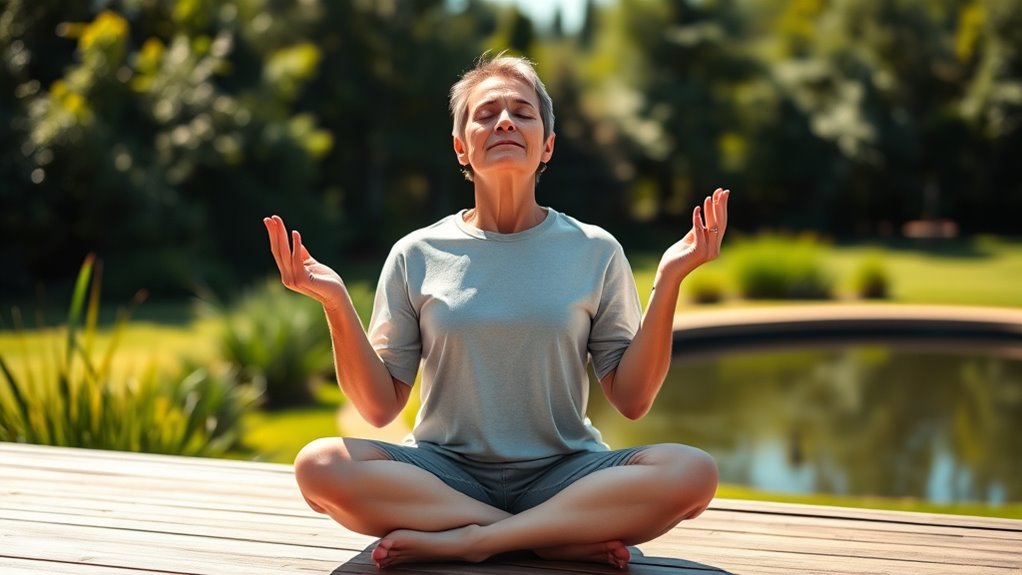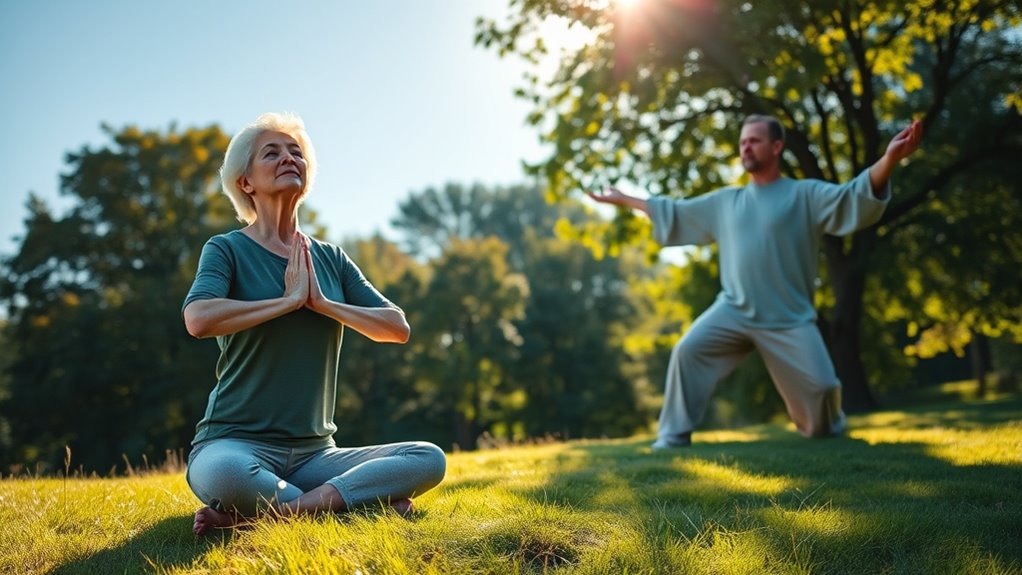To manage midlife stress, try deep breathing exercises to calm your body, or practice guided meditation to stay present and reduce anxiety. Incorporate body scans to release tension and gentle movement like yoga or Tai Chi for relaxation and focus. Journaling helps process emotions and boosts self-awareness, while cultivating compassion can increase emotional balance. By integrating these mindful routines daily, you’ll strengthen your resilience. Keep exploring these techniques to discover more ways to support your well-being during midlife.
Key Takeaways
- Deep breathing exercises activate the parasympathetic nervous system to calm stress and promote relaxation.
- Guided meditation enhances present-moment awareness, reducing anxiety common during midlife.
- Body scan techniques release physical tension, improving sleep quality and internal awareness.
- Mindful movement practices like yoga and Tai Chi decrease anxiety and boost emotional resilience.
- Journaling fosters emotional reflection, helping midlifers process stress and identify patterns affecting well-being.
Deep Breathing Exercises to Calm the Mind and Body

Deep breathing exercises are a simple yet powerful way to calm your mind and body, especially during stressful midlife moments. When you focus on your breath, you activate your parasympathetic nervous system, which helps counteract the fight-or-flight response. Regular practice can lower your blood pressure and improve your cardiovascular health. You don’t need any equipment—just a quiet space and a few minutes. Deep breathing also helps manage chronic health conditions by promoting relaxation and easing stress-related symptoms. As you practice consistently, your body becomes more responsive to stress, leading to long-term benefits. Incorporating autonomic nervous system regulation techniques into your routine can further support your health and well-being. You can do these exercises anywhere, anytime, making them a practical, cost-effective tool to reduce anxiety and promote overall well-being during midlife. Additionally, practicing deep breathing can enhance your stress management skills, helping you navigate daily challenges more effectively. Engaging in consistent deep breathing exercises can also strengthen your autonomic nervous system regulation, contributing to better overall health.
Guided Meditation for Present-Moment Awareness

Guided meditation for present-moment awareness offers a practical way to cultivate mindfulness and reduce stress during midlife. It helps you focus on now, easing anxiety and enhancing mental clarity. Regular practice increases self-control and promotes a sense of calmness under pressure, improving overall well-being. Using guided recordings, you can develop a habit that fits into busy schedules. Incorporating mindfulness practices into your daily routine can further deepen your sense of presence and emotional stability, especially when supported by industry trends that emphasize mental health. Engaging in these practices can also help manage dream-related stress, which is common during stressful periods in midlife. Additionally, choosing the right air purifier can create a healthier environment that complements your mindfulness efforts by reducing airborne pollutants and allergens. Developing emotional intelligence through mindfulness can enhance your ability to navigate challenging situations with resilience.
Body Scan Techniques to Release Tension

Body scan techniques provide an effective way to release physical tension and promote relaxation, especially during midlife when stress can accumulate. By systematically focusing on different body parts, you become more aware of sensations and areas of tightness. Find a quiet, comfortable space to sit or lie down, and begin with deep breathing to calm your mind. As you move through your body, acknowledge each sensation without judgment, using your breath to release tension. This practice activates your parasympathetic nervous system, reducing stress, inflammation, and fatigue. Regular body scans can improve sleep quality and increase your awareness of internal signals, fostering self-compassion and emotional regulation. Incorporating mindfulness practices into your routine can further enhance your ability to stay present and manage stress effectively. Developing body awareness can help you recognize early signs of tension and address them proactively. Additionally, consistent practice can lead to improvements in neuroplasticity, supporting long-term emotional resilience. This technique also encourages the development of sound design skills, as focusing on subtle sensations can enhance your sensory perception and attention to detail. Engaging in consistent practice reinforces neural pathways associated with relaxation and mindfulness, making these benefits more enduring. Over time, this technique helps you feel more relaxed, centered, and better equipped to handle midlife stressors.
Mindful Movement Practices: Yoga and Tai Chi

Mindful movement practices like yoga and Tai Chi offer effective ways to reduce stress by combining gentle physical activity with focused awareness. These practices increase your heart rate to moderate levels, providing physical engagement without overexertion. After sessions, you’ll notice decreased anxiety levels, as measured by psychological inventories like the STAI. EEG studies show increased theta wave activity, indicating enhanced relaxation and mental calmness. Practicing regularly can also improve cognitive performance, helping you think faster and more accurately. To summarize:
Mindful movement like yoga and Tai Chi reduces stress through gentle activity and focused awareness, enhancing relaxation and mental clarity.
- They promote physical engagement and relaxation simultaneously.
- They reduce anxiety and stress markers psychologically and physiologically.
- They foster mental clarity and cognitive sharpness over time, supported by practices that enhance resilience and persistence.
- Incorporating mindful movement practices aligns with emotional well-being, leading to a more balanced and peaceful mind. For example, engaging in these activities can help counteract the effects of biodiversity loss on mental health by providing a grounding connection to nature. Additionally, integrating mindfulness techniques into daily life can deepen the benefits and promote sustained mental health improvements. Regular practice of these techniques also cultivates attention regulation, which is essential for maintaining mental balance and resilience during stressful times.
Incorporating these mindful movements into your routine supports both your body and mind during midlife.
Journaling for Emotional Reflection and Self-Awareness

Journaling serves as a powerful tool for emotional reflection and self-awareness, allowing you to explore your thoughts and feelings in a safe, private space. It helps process emotions, reducing stress, anxiety, and depression by providing an outlet for expressing difficult experiences. Regular journaling uncovers patterns and triggers that influence your mental health, giving you insight into behaviors and emotional responses. This clarity supports better decision-making and healthier habits. Journaling also promotes emotional regulation, helping you manage stress more effectively. Over time, it fosters personal growth and resilience, with long-term mental health benefits. By engaging your prefrontal cortex, journaling organizes traumatic memories and facilitates emotional healing, making it an accessible, therapeutic practice to navigate midlife challenges with greater self-awareness. Data-driven strategies can enhance your understanding of emotional patterns and improve your overall mental well-being. Incorporating mental clarity techniques into your journaling routine can further optimize your emotional insights, especially when you explore celebrity transformations and their impacts on personal growth. Additionally, understanding the neuroscience of mindfulness can deepen your journaling practice, helping you harness its full potential for emotional health. Recognizing relationship dynamics can provide valuable context for your emotional reflections and growth.
Cultivating Compassion and Self-Compassion

Cultivating compassion and self-compassion can considerably enhance your emotional well-being during midlife, especially as you face various life changes and stressors. When you develop these qualities, you reduce conflict, improve communication, and foster emotional resilience. You can:
- Engage in compassion-focused programs that boost mindfulness and decrease stress.
- Practice self-compassion to lower burnout, increase well-being, and strengthen coping skills.
- Combine mindfulness with compassion to deepen stress relief and emotional balance.
These practices not only improve your relationships but also help manage anxiety and mental fatigue. Regularly cultivating compassion for yourself and others creates a supportive foundation for *steering* midlife challenges with greater ease and emotional stability.
Developing Focus and Reducing Rumination

As you navigate midlife challenges, developing sharper focus and reducing rumination can considerably improve your emotional resilience. Mindfulness-based practices like MBSR boost awareness, helping you stay present and less distracted. They also improve cognitive functions, sharpening attention and focus. To combat rumination, mindfulness encourages non-judgmental awareness, enabling you to observe negative thoughts without getting trapped. This process reduces stress and emotional reactivity, fostering better emotional regulation. Participating in group mindfulness sessions can offer social support, strengthening your focus. Here’s a quick overview:
| Technique | Benefit | How it Works |
|---|---|---|
| Attention Training | Sharper focus | Focus on the present moment |
| Non-Judgmental Awareness | Reduce rumination | Observe thoughts objectively |
| Emotional Regulation | Manage emotional responses | Reframe negative thoughts |
Integrating Mindfulness Into Daily Routines

You can easily incorporate mindfulness into your daily routine by starting with brief practices in the morning or during breaks. Simple activities like mindful breathing during coffee or a quick body scan before meetings help keep you centered. These small, consistent moments make it easier to stay present and reduce stress throughout the day.
Morning Mindfulness Practices
Integrating mindfulness into your morning routine can set a positive tone for the entire day, helping you manage stress and increase mental clarity. Starting each day with a mindful practice boosts energy, improves brain function, and reduces anxiety. To make it effective, consider these steps:
- Choose a consistent time, like right after waking up, to build a habit.
- Create a quiet, comfortable space free of distractions.
- Use tools like guided recordings or meditation apps to stay focused.
Practicing deep breathing, body scans, or mindfulness meditation can calm your mind and sharpen your focus. Over time, these habits support better sleep, increased productivity, and improved emotional regulation—key benefits for steering midlife stress.
Incorporating Breaks Throughout Day
Incorporating mindfulness breaks into your daily routine can greatly reduce stress and boost focus throughout the workday. Short, regular mindfulness sessions help reset your mental state, improve emotional regulation, and sustain concentration. Guided imagery during breaks can enhance resilience, while mindful movement like stretching or yoga boosts both physical and mental well-being. Creating quiet spaces for reflection makes it easier to practice mindfulness consistently. Integrating these practices into your schedule normalizes mindfulness, encouraging ongoing participation. Accessible resources, such as apps or guided sessions, make it simple to practice anytime. Support from leadership and feedback mechanisms can foster a culture of mindfulness. By embedding these small breaks into your day, you’ll experience increased productivity, better decision-making, and reduced stress—all essential for thriving during midlife.
Frequently Asked Questions
How Long Does It Take to See Benefits From Mindfulness Practices?
When you start practicing mindfulness, you can notice benefits within a few weeks. Stress levels often decrease early, sometimes in just a few sessions. With consistent daily practice of about ten minutes, improvements in mood, focus, and emotional regulation typically emerge after six to eight weeks. Longer commitment deepens these benefits, and individual differences may influence how quickly you experience changes. Keep practicing regularly for the best results.
Can Mindfulness Techniques Be Adapted for Severe Stress or Anxiety?
Think of your mind as a stormy sea; mindfulness acts like a gentle lighthouse guiding you through chaos. You can adapt these techniques for severe stress or anxiety by starting with brief, focused practices like deep breathing or body scans. With patience, gradually increase the time and complexity. In doing so, you create a safe harbor within, helping to calm the storm and regain control amid life’s turbulence.
Is Prior Meditation Experience Necessary to Start Mindfulness Exercises?
You don’t need prior meditation experience to start mindfulness exercises. Simply begin with easy practices like deep breathing or body scans. Guided sessions are available online or through apps, making it accessible for beginners. These exercises help you become more aware of the present moment, reduce stress, and improve your well-being. Even a few minutes a day can make a difference, so don’t hesitate to give it a try.
How Can I Stay Consistent With Mindfulness Routines Daily?
Think of your mindfulness routine as planting a seed; consistency helps it grow strong. You can stay on track by keeping your practice simple and short, making it part of your daily schedule. Set a specific time each morning, and stick to it like clockwork. Remember, it’s about progress, not perfection. Joining a community or tracking your practice can boost motivation, turning mindfulness into a natural rhythm in your life.
Are There Any Contraindications or Risks Associated With Mindfulness Practices?
You should know that mindfulness practices can carry some risks, especially if you have a history of trauma, mental health issues, or emotional instability. It’s important to consult a professional before starting, monitor your reactions closely, and adjust the intensity if needed. Be aware of potential adverse effects like increased anxiety, flashbacks, or sleep problems, and stop if you experience severe distress. Prioritize your safety and well-being throughout your practice.
Conclusion
So, there you have it—your secret weapon against midlife chaos. With a little deep breathing, mindful movement, and some journaling, you’ll be a Zen master in no time. Who knew that sitting quietly and focusing on your breath could be so revolutionary? Just remember, when life gets overwhelming, take a deep breath, smile, and pretend you’re a serene Buddha—at least until your next midlife meltdown!









